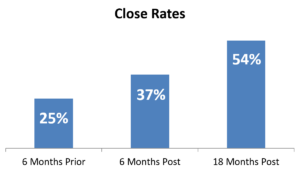How One Conversation Elevates Sales Results
What separates a great manager from a mediocre one? While there are lots of little actions that divide wheat from chaff, there is one activity that elevates a manager’s performance to the top tier: time spent with reps in meaningful pipeline discussions.
Vantage Point conducted research into the practices of high-performing sales teams over the past two years, and the results show a clear and strong correlation between team performance and pipeline examination. High-performing managers make dedicated time for in-depth opportunity discussions about early-stage deals. This is good news as it makes the pathway to improved sales quite straightforward: to elevate team performance, set aside time to have these conversations.
Vantage Point’s research into this area includes comprehensive responses from 512 sales managers across 12 industries and all geographic regions of the world. Our goal for this two-year project was to identify those specific management practices that led to a higher percentage of sales reps at or above quota. It was not enough for a manager to “make plan”; instead, we were looking for practices that led to higher participation across the entire sales team. We didn’t want general coaching insights; we wanted specific management practices by sales role that led to higher levels of quota achievement.
We defined “high performing” managers as those with 75% or more of their team members at or above quota for the prior year. We didn’t use revenues as the basis for management performance because it is too easy for one or two superstar reps to elevate revenues regardless of management practices. When the vast majority of a team is making or exceeding quota, this is a sign that the manager is highly effective.
“Average” managers included those with 25%-75% of their team making quota and “low-performing” managers included anyone with less than 25% of their team members at or above quota. Interestingly, the number of managers falling into each bucket created a near-perfect bell curve. One-quarter of the managers I interviewed fell into the top group, half were average, and 25% were in the low tier.
As I stated earlier, the one activity that high-performing managers do consistently and others do not is devote time to discussing pipelines with individual reps. There are the three parts to this winning formula:
1. Time. Managers who spend more than three hours per month in pipeline discussions with individual reps produce 11% higher average revenues than managers who spend less than three hours per rep per month. Of note: performance doesn’t continue to climb with more than three hours of pipeline coaching. While there’s a slight bump in results once managers hit the 6- to 8-hour per month mark, it is relatively insignificant. The real tipping point is three hours. Coach more than that and your revenues will be higher.
Here’s why: If all you are doing in your pipeline conversations is scrubbing the data to develop your forecast, that doesn’t take very long. It certainly doesn’t take more than three hours per month. Which means that managers who spend more than three hours a month in pipeline discussions are going beyond a data scrub to dig deep into individual opportunities. Those are the conversations that impact sales results.
2. Early-stage deal strategizing. As part of this research, we asked managers to select from a list indicating the most prevalent topic in their pipeline discussions. For low performers, the most prevalent topic is updating the forecast and cleaning the pipeline. For high performers, it is developing strategies to pursue opportunities. In particular, high-performing managers focus intentionally on deals in the early stages. They know their sellers need to get good deals in and bad deals out so they look hard at the deals reps are putting into the pipeline. They ask hard questions that challenge reps to make sure the deals are real and eject the ones that aren’t. The result: reps working for high-performing managers spend their time pursuing only solid deals and therefore have higher close rates.
This is in contrast to low-performing managers, whose focus is typically on the size of the pipeline rather than the quality. As a result, pipelines here are often unhealthy and reps dilute their focus chasing all deals rather than just the ones likely to close.
3. Scheduled conversations. High-performing managers are significantly more likely to formally schedule their opportunity planning discussions, whereas low-performing managers tend to conduct them ad hoc. These scheduled meetings are one-on-one with individual reps, last about an hour, and happen a couple times a month. All managers have to scrub pipeline data to create a forecast, however, the best managers then move beyond the administrative scrub into high-impact coaching conversations.
Vantage Point saw this firsthand when we worked with sales managers at a large global company. When we first arrived, average close rates were 25% of forecasted revenue. After managers began meeting with reps twice a month to have focused discussions on early-stage deals, close rates climbed to 37%. Eighteen months after the change, close rates were at 54%. In other words, this single conversation doubled the company’s close rates. If you aren’t having this conversation with your own reps, you are missing out on the single most powerful method of improving your team’s performance.

The Power of Pipeline Coaching Conversations
When sales managers make this one change to their management approach—when they add scheduled, in-depth, one-on-one discussions about early-stage deals to their regular pipeline scrubs—team performance improves remarkably.
VantagePoint Performance is now part of Imparta, a global leader in performance improvement for customer-facing teams.